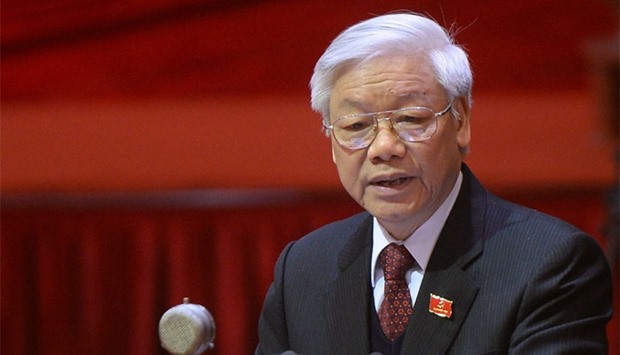Vietnam's top communist leader Nguyen Phu Trong was re-elected Wednesday in a victory for the party's old guard which some fear could slow crucial economic reforms in the fast-growing country.
Factional fighting overshadowed a week of closed-door talks at the five-yearly Communist Party Congress. But Trong, 72, retained his position while his rival -- reformist Prime Minister Nguyen Tan Dung -- was pushed from power.
Dung remains prime minister but will step down later this year when the National Assembly convenes to appoint a replacement.
This is expected to be Nguyen Xuan Phuc, currently a deputy prime minister, state media said.
"Delegates to the first meeting of the party's central committee congratulated Comrade Nguyen Phu Trong who was elected general secretary," the official Vietnam News Agency reported.
Trong, 72, seen as more of a conservative apparatchik and closer to China than Dung, has been party chief since 2011 and will stay on following a compromise deal which analysts say is a move back towards more consensus-based decision-making.
Dung, 66, a two-term prime minister and political heavyweight, is credited with pushing a pro-business agenda and talking tough to China over a festering maritime dispute.
He had been tipped to ascend to the party leader position but in the end he lost out in internal elections. He was not selected for the 180-member central committee, which in effect ends his official political career.
The charismatic Dung was a rare "political celebrity" amid the communist country's faceless collective leadership, Jonathan London, a Vietnam expert at City University of Hong Kong, told AFP, adding that this style alienated other cadres.
'Go slow approach'
Although both his reformist credentials and achievements in office were debatable, he was unquestionably "someone who had a vision", said London, adding that his exit marked a return to a more moderated style of governance.
"The (Communist) Party has been around for 85 years and always been steered by committee -- in this context, the 'go slow' approach makes sense," he added.
Trong's ascent -- which owes as much to Dung's divisiveness as to his own popularity -- is unlikely to mark a dramatic change of course on key issues such as a dispute with Beijing over parts of the South China Sea and participation in a series of trade deals, including the US-led Trans Pacific Partnership.
The entire politburo -- which was also elected Wednesday with 19 members -- is committed to economic reforms and the change in leadership is more "a question of style", economist Bui Kien Thanh told AFP.
"I don't see the machine going backwards... no one is completely indispensable," he said, referring to fears that Dung's exit would stall economic reforms and integration of Vietnam into the global economy.
Dung himself was hardly "a superstar reformer" and his successor will undoubtedly continue key economic reforms so most foreign investors are not concerned, said Tony Foster, a lawyer with Freshfields.
"The stability in the system is extraordinary, and from a foreign investors' point of view a big positive," he added.
Dung's 40-year-old son Nguyen Thanh Nghi was elected to the central committee, alongside other politicians seen as his allies, including the Transport Minister Dinh La Thang and Foreign Minister Pham Binh Minh.
Some observers had expressed concern that Trong could end up sidelining competent officials in favour of the party faithful. But one senior state employee played down the problem and said personnel changes were to be expected.
"When you're part of the system your survival depends on being flexible. It's the most important thing," she told AFP on condition of anonymity.

Nguyen Phu Trong
